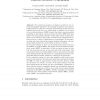Free Online Productivity Tools
i2Speak
i2Symbol
i2OCR
iTex2Img
iWeb2Print
iWeb2Shot
i2Type
iPdf2Split
iPdf2Merge
i2Bopomofo
i2Arabic
i2Style
i2Image
i2PDF
iLatex2Rtf
Sci2ools
112
click to vote
EUROCRYPT
2001
Springer
2001
Springer
On Perfect and Adaptive Security in Exposure-Resilient Cryptography
Abstract. We consider the question of adaptive security for two related cryptographic primitives: all-or-nothing transforms and exposureresilient functions. Both are concerned with retaining security when an intruder learns some bits of a string which is supposed to be secret: all-or-nothing transforms (AONT) protect their input even given partial knowledge of the output; exposure-resilient functions (ERF) hide their output even given partial exposure of their input. Both of these primitives can be defined in the perfect, statistical and computational settings and have a variety of applications in cryptography. In this paper, we study how these notions fare against adaptive adversaries, who may choose which positions of a secret string to observe on the fly. In the perfect setting, we prove a new, strong lower bound on the constructibility of (perfect) AONT. This applies to both standard and adaptively secure AONT. In particular, to hide an input as short as log n bits, the adversary...
Adaptive | All-or-nothing Transforms | Cryptology | EUROCRYPT 2001 | Related Cryptographic Primitives |
| Added | 28 Jul 2010 |
| Updated | 28 Jul 2010 |
| Type | Conference |
| Year | 2001 |
| Where | EUROCRYPT |
| Authors | Yevgeniy Dodis, Amit Sahai, Adam Smith |
Comments (0)

